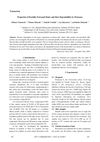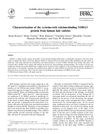18 citations,
April 2018 in “Biotechniques/BioTechniques” A new method was developed to extract and analyze proteins from very short human hairs.
13 citations,
April 2002 in “International Journal of Toxicology” The safety of placental and umbilical extracts in cosmetics is uncertain, requiring more research.
 4 citations,
May 2019 in “Zeitschrift für Naturforschung C”
4 citations,
May 2019 in “Zeitschrift für Naturforschung C” Ishige sinicola extract helps bone-building cells grow and mature, which could aid in treating osteoporosis.
 April 2024 in “Research Square (Research Square)”
April 2024 in “Research Square (Research Square)” MSC-protein helps regenerate gum tissue and bone.
 12 citations,
December 2017 in “Journal of biomaterials science. Polymer ed.”
12 citations,
December 2017 in “Journal of biomaterials science. Polymer ed.” Human hair protein extracts can protect skin cells from oxidative stress.
 September 2016 in “Journal of Dermatological Science”
September 2016 in “Journal of Dermatological Science” Protein extract from embryonic skin can create new hair follicles in adult life, primarily through effects on fibroblasts.
July 2020 in “International Journal of Cosmetic Science” The study found that minor protein differences between curved and straight Japanese hair are unlikely to significantly affect hair structure.
 December 2023 in “Chiwi'saeng'gwa haghoeji”
December 2023 in “Chiwi'saeng'gwa haghoeji” Hair keratin protein might help heal mouth wounds faster.
 January 2007 in “Sen'i Gakkaishi”
January 2007 in “Sen'i Gakkaishi” Mf-rich hair degrades more than Ma-rich hair, especially with Proteinase K.
22 citations,
August 2015 in “PloS one” Keratin from hair binds well to gold and BMP-2, useful for bone repair.
 24 citations,
December 2014 in “International Journal of Molecular Medicine”
24 citations,
December 2014 in “International Journal of Molecular Medicine” Eclipta alba extract helps increase hair growth and decrease hair loss-related protein in mice.
 17 citations,
December 2002 in “Biochemical and biophysical research communications”
17 citations,
December 2002 in “Biochemical and biophysical research communications” Scientists found out how a specific protein in human hair cuticles behaves and is structured.
 4 citations,
September 2020 in “Annals of Translational Medicine”
4 citations,
September 2020 in “Annals of Translational Medicine” Concentrated nanofat helps mice grow hair by activating skin cells and may be used to treat hair loss.
47 citations,
September 2011 in “Acta biomaterialia” Protein composition greatly affects the function of keratin biomaterials.
 September 2016 in “Springer eBooks”
September 2016 in “Springer eBooks” Fat-derived stem cells may help treat skin aging and hair loss.
 May 2024 in “Proteome science”
May 2024 in “Proteome science” Bleaching damages hair by reducing the quality of keratin and keratin-associated proteins.
 January 2015 in “Springer eBooks”
January 2015 in “Springer eBooks” Fat-derived stem cells and their secretions show promise for treating skin aging and hair loss.
5 citations,
January 2012 in “International journal of trichology” Chemotherapy-induced hair loss is a major concern, but various treatments show promise in preventing and reversing it.
 May 2018 in “Journal of Cosmetic and Laser Therapy”
May 2018 in “Journal of Cosmetic and Laser Therapy” The editorial discusses the effectiveness and safety of various laser and energy-based cosmetic treatments.

The research found that people's hair proteins vary, especially by ethnicity and body part, which could help identify individuals in forensic science.
 11 citations,
August 2013 in “International Journal of Cosmetic Science”
11 citations,
August 2013 in “International Journal of Cosmetic Science” The study suggests that a new protease inhibitor can make hair harder to pull out, potentially reducing hair loss.
 1 citations,
June 2023 in “International journal of biological macromolecules”
1 citations,
June 2023 in “International journal of biological macromolecules” Human hair proteins can help blood clot when mixed in equal parts.

The research found that people's hair proteins vary by individual and body part, with some differences between ethnic groups, which could help in forensics.
13 citations,
April 2010 in “Journal of dermatological science” Chemotherapy-induced hair loss is partly due to decreased laminin-511 and increased laminin-332.
 6 citations,
April 2010 in “Journal of Dermatological Science”
6 citations,
April 2010 in “Journal of Dermatological Science” Laminin-511 may help promote hair growth, while laminin-332 does not affect hair loss.
Hair can naturally regain color, and stress might influence greying and its reversal.
 November 2022 in “The journal of investigative dermatology/Journal of investigative dermatology”
November 2022 in “The journal of investigative dermatology/Journal of investigative dermatology” The study found markers indicating that cells responsible for hair color are differentiating in specific areas of the hair follicle.
Green tea compound EGCG could potentially treat colorectal cancer by removing iron and causing stress in cancer cells leading to their death.
 16 citations,
November 1992 in “Journal of International Medical Research”
16 citations,
November 1992 in “Journal of International Medical Research” ViviScal®, a food supplement, was found to be highly effective in treating hereditary hair loss in young males, while fish extract showed no impact.
 4 citations,
December 2015 in “Journal of Medicinal Plants Research”
4 citations,
December 2015 in “Journal of Medicinal Plants Research” A plant mixture extract helped grow hair by boosting cell growth and growth factors while blocking a hair loss-related enzyme.




















